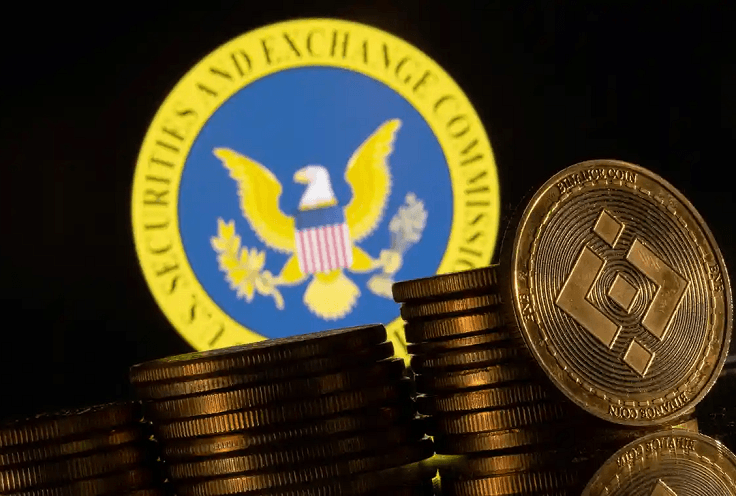For years, US financial regulators couldn’t agree on what to do about cryptocurrency. They wanted to do something, but couldn’t agree on what crypto was – a security, like a stock or bond, or a commodity, like a raw material or agricultural product, or neither? – and which agency would have jurisdiction.
This week, Gary Gensler, a longtime critic of crypto and the chair of the US Securities and Exchange Commission (SEC), appears to have found the answer – by launching a crackdown on crypto exchanges, the platforms on which investors buy and sell digital currencies.
The effort to establish clarity came in the form of back-to-back lawsuits. The first accused industry giant Binance of a range of securities violations, including mishandling customer funds and misleading investors and regulators. And, the second claimed that the biggest US crypto platform Coinbase of running an illegal exchange.
A 101-page lawsuit filed in federal court in New York on Tuesday alleges Coinbase skirted SEC rules for years by letting users trade crypto tokens that were actually unregistered securities.
Gensler has repeatedly argued that most tokens fall under SEC oversight, and has warned government-regulated banks to steer clear. By declaring Coinbase an illegal exchange, the SEC chief makes it harder for US crypto traders to trade digital tokens.
In an interview with Bloomberg, Gensler depicted the crackdown as an effort to protect investors and the integrity of US securities markets.
“Why should the New York stock exchange or broker-dealers we all know and respect be undermined by this other corner of the capital markets, which is sort of saying, thumbing their nose and saying, ‘Catch us if you can’,” he said.
The lawsuit
Lawsuit against Binance, the world’s largest token exchange, takes a different approach. The 136-page complaint accuses the company of avoiding rules by letting Americans improperly open accounts and trade. In a statement, Gensler said Binance and its chief executive, Changpeng Zhao, had “engaged in an extensive web of deception, conflicts of interest, lack of disclosure, and calculated evasion of the law”.
Binance issued a statement saying that it will “vigorously defend itself” in the case against the SEC.
The SEC’s moves against Coinbase and Binance do not address whether cryptocurrencies are securities or commodities, a debate that has caused confusion for regulators and meant that for years regulation of the digital token business has fallen between the two stools of the SEC and the Commodity Futures Trading Commission (CFTC).
But the SEC is involved in a lawsuit that may decide whether it has jurisdiction over crypto. In 2020, the SEC sued the tech payment and exchange company Ripple, contending that its XRP token is a security. The regulator alleges Ripple illegally raised almost $1.4bn by selling XRP in violation of investor-protection rules.
The company is aggressively fighting the suit – it expects to have spent $200m on its defense. Chief executive Brad Garlinghouse has argued that Gensler himself has issued contradictory statements about digital assets.
“You have video footage of the chair of the SEC, as a professor at MIT, saying 75% of these digital assets are commodities,” he told CNBC. “And now he says they’re all securities because he’s the head of the SEC and he’s seeking power and he’s putting power ahead of sound policy to grow an economy in the United States.”
A ruling is expected this year
In its complaint, the SEC contends that a dozen or more tokens offered on Coinbase are also securities.
But the Coinbase lawyer Paul Grewal pointed out that the SEC’s move – “an enforcement-only approach” – came without clear guidance on virtual currencies and as such “is hurting America’s economic competitiveness”.
Coinbase’s chief executive, Brian Armstrong, told a Bloomberg conference on Wednesday the platform would carry on as normal. He said: “As these court cases play out, it’s really business as usual.”
The SEC’s main role is to look for financial fraud in investing, and that mandate covers securities. When the SEC was established in 1932, it was clear what was a stock and what was a bond, says Elson. “Today, that definition has broadened quite a bit,” he said.
“The agency that is charged with protecting the investing public views these cryptocurrencies as monetary investments, and this expands their jurisdiction to cover what they think is problematic. Anytime they see an investment they think looks and smells like a security they’re going to be interested.”
About the collapse of FTX
The collapse of crypto exchange FTX last year put crypto in Washington’s headlights – not least because FTX’s founder, Sam Bankman-Fried, was a major political donor. Since its collapse, US regulators have increased their scrutiny of the sector.
Some analysts believe this latest spate of legal moves will lead to a clearer set of rules for crypto. In a note to investors this week, analysts at TD Cowen wrote: “This litigation may not be a positive for Coinbase, but it should be a positive for the crypto space. It should get crypto closer to final rules of the road regardless of how the judge rules.”
But in a clear message on Tuesday, Gensler underlined his antipathy to the sector and made it clear that he did not believe digital currencies are a necessary form of currency. “Look, we don’t need more digital currency,” he told CNBC. “We already have digital currency: it’s called the US dollar. It’s called the euro or it’s called the yen; they’re all digital right now. We already have digital investments.”
According to Elson, however, the SEC’s natural instinct to expand its reach to crypto exchanges resolves the question of which regulator would take on the challenge of crypto.
“One way or the other there was going to be regulation,” he says. “It’s one of those things where technology has leapfrogged regulatory authority. The whole thing is ephemeral. Crypto is cloud-like in its origins and cloud-like in how it’s carried out. It’s very strange form of investing.
“You’d hope this will make it safer for the public to invest in crypto.”
Source: US targets Binance and Coinbase – is the government ready to regulate crypto?.







